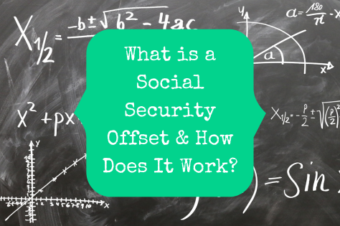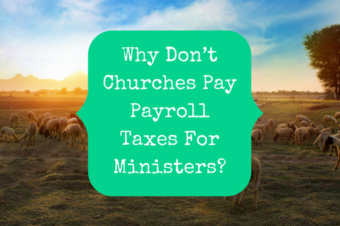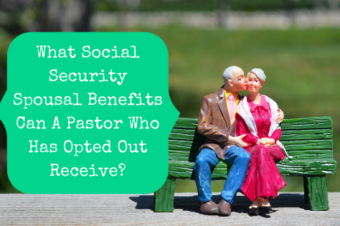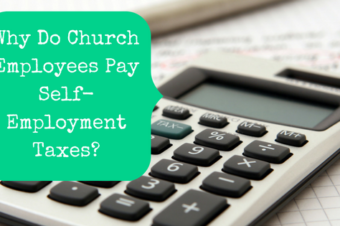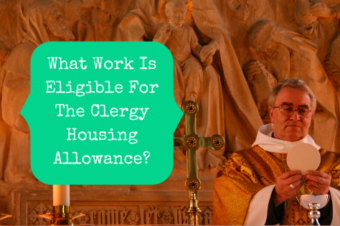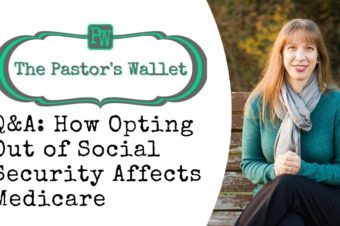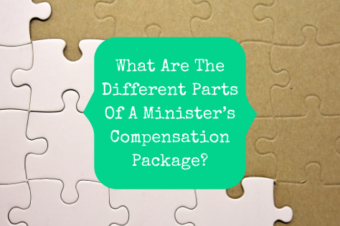So, you’re entering the ministry and you’re excited. You’re excited to devote your life to God’s work. You’re excited to make an eternal impact on the world. And you’re excited to do your taxes in a completely new way.
No, not really. If that kind of thing excited you, you would be a CPA instead of a pastor. Even though you’re new to pastoral ministry, you’ve probably already heard a thing or two about clergy taxes from seasoned veterans. And there’s a good chance that there are conflicts in what you’ve heard.
One of the biggest areas of confusion when it comes to a minister’s taxes relates to Social Security and Medicare. There are a lot of myths floating around, both inside and outside the church. Let me see if I can clear things up for you.
How Social Security & Medicare Taxes Work
Social Security and Medicare taxes are paid by all workers and deducted directly from their paychecks. Because of this, they are often called payroll taxes. Traditionally, the employee pays half of the taxes and the employer pays half of the taxes. Self-employed people, being both employee and employer, have to pay both halves, or the total tax.
For 2019, the Social Security tax rate is 6.2% each for employee and employer and the Medicare tax rate is 1.45% each. That means that 7.65% is automatically deducted from every employee’s paycheck. Self-employed people have to pay 15.3% total.
Social Security has a wage-base limit. That means that the Social Security tax only applies to the first $132,900 of income. Above that, the Social Security tax no longer applies. Medicare taxes always apply. In fact, they actually get higher if you earn a lot. High-income earners have to pay an extra Additional Medicare Tax, so they have an extra 0.9% withheld once their income exceeds $200,000.
Do Pastors Have To Pay Social Security & Medicare Taxes?
Social Security and Medicare taxes are pretty straightforward for most people. Not for pastors, though. Both how they pay them and whether or not they even have to are very unique for pastors. Unique, meaning complicated and causing lots of confusion.
First, let’s address whether pastors even have to pay Social Security and Medicare taxes. For everyone else, it’s required. They have no choice in the matter. But, pastors have a choice. At least regarding their ministerial income.
If you can honestly say, “I am conscientiously opposed to, or because of my religious principles I am opposed to” the acceptance of public insurance, then you can opt out. You only have a brief window of time where this option is available and you have to fill out an IRS form and follow their process. And, if you opt out, it’s permanent. You can never opt back into Social Security for your ministerial income. (Though you still may be able to receive benefits even after opting out.) For more information, follow the links in this paragraph.
How Do Pastors Pay Social Security & Medicare Taxes?
Thus, at the beginning of your ministry, you have the opportunity to opt out of the Social Security and Medicare programs and their taxes related to your ministerial income. Even if you opt out, any secular jobs you hold will still be subject to payroll taxes.
But what if you don’t opt out? Does it work for you just like it does for everyone else? No way! That would be too easy!
All pastors have to pay Social Security and Medicare taxes as if they were self-employed. Even if you work for a church and receive a W-2. And you have no choice in the matter, it’s the law. Churches aren’t even allowed to withhold payroll taxes for pastors. (Some non-pastoral church employees also have to pay their taxes this way as well.) If you want to learn more about these crazy rules, follow the links in this paragraph.
How do pastors actually pay these taxes, then, if they can’t do it as employees? Well, throughout the year, you should either be paying estimated quarterly taxes or having your church withhold taxes (technically, only income taxes) from your paycheck. Then, when you file your tax return, you have to fill out Schedule SE to calculate your Social Security and Medicare taxes.
On your tax return, your Schedule SE taxes are added together with your income taxes for your final tax bill. Because of this, even though your church can’t withhold payroll taxes for you, they can withhold extra income taxes to make up the difference. If you end up owing money, it means your church isn’t withholding enough or your estimated payments were too low. If you get a refund, it means the opposite.
There you have it, that’s how Social Security and Medicare taxes work for pastors. If you have further questions, ask them in the comments or send me a quick email!



